- Home
- Keith R. A. DeCandido
DIPLOMATIC IMPLAUSIBILITY
DIPLOMATIC IMPLAUSIBILITY Read online
Governor Tiral pounded his fist on the desk. “This is outrageous! They are jeghpu’wl’. They have no more right to appeal to the Federation than my pet targ.
“I am responsible for this planet, Ambassador, and I will not have its fate decided by outsiders—especially not a coward who has lived his life among inferiors, and who has twice been declared a traitor.”
Worf rose from his chair. “This meeting is over.”
“What?”
“There is no point to this. The solution to what ails taD is obvious—replace the governor. I daresay the situation has gotten out of hand because its current leader is not fit for the job. He has been presented with a Federation ambassador. His response is to indulge in name-calling. Fit behavior for a tavern, perhaps, but not a meeting to settle an issue important to the empire.”
Tiral also stood up, unsheathing a d’k tahg. “You dare insult me?”
Behind him, his three guards moved forward, pointing their disruptors at Worf.
Worf ignored the guards and stared at Tiral without blinking. “I do not mean to insult, Governor. I have simply made a statement based on my interpretation of what I have been presented with. It is possible that my interpretation is in error.” He leaned forward, resting his fists on the desk. “Convince me that it is.”
DIPLOMATIC
IMPLAUSIBILITY
KEITH R.A. DeCANDIDO
POCKET BOOKS
New York London Toronto Sydney Singapore
This book is a work of fiction. Names, characters, places and incidents are products of the author’s imagination or are used fictitiously. Any resemblance to actual events or locales or persons, living or dead, is entirely coincidental.
An Original Publication of POCKET BOOKS
POCKET BOOKS, a division of Simon & Schuster, Inc.
1230 Avenue of the Americas, New York, NY 10020
Visit us on the World Wide Web:
http://www.SimonSays.com/st
http://www.startrek.com
Copyright © 2001 by Paramount Pictures. All Rights Reserved.
STAR TREK is a Registered Trademark of Paramount Pictures.
This book is published by Pocket Books, a division of Simon & Schuster, Inc., under exclusive license from Paramount Pictures.
All rights reserved, including the right to reproduce this book or portions thereof in any form whatsoever. For information address Pocket Books, 1230 Avenue of the Americas, New York, NY 10020
ISBN: 0-7434-1950-2
POCKET BOOKS and colophon are registered trademarks of Simon & Schuster, Inc.
Prologue
Chapter One
Chapter Two
Chapter Three
Chapter Four
Chapter Five
Chapter Six
Chapter Seven
Chapter Eight
Chapter Nine
Epilogue
Glossary of Klingon Terms
Acknowledgments
About the Author
Look for STAR TREK fiction from Pocket Books
For Bertram S.A. Herbert, without whomI might not be where I am today
HISTORIAN’S NOTE
This novel takes place shortly after “What You Leave Behind,” the final episode of Star Trek: Deep Space Nine, and several months after the movie Star Trek: Insurrection. This would place it at approximately Stardate 53000 in the Starfleet dating system, at the cusp of the 2375/2376 new year on the Earth calendar, and about midway through the year 1001 on the Klingon calendar.
Prologue
CAPTAIN KLAG’S RIGHT ARM ITCHED.
Since he had lost that arm six months previously in battle against the Jem’Hadar, this irritated him.
“Status,” he said. He was sitting in the captain’s chair on the bridge of the I.K.S. Gorkon—one of the newest ships in the Klingon Defense Force, and also Klag’s first command.
His first officer, Commander Drex, was standing next to Lieutenant Rodek at the gunner’s post behind Klag. Drex walked to the fore of the bridge. “All systems remain at peak operation, Captain,” he said in a deep voice that reminded Klag of sandpaper being applied to a rock. “All department heads report the shakedown cruise a success.”
“Good. Is there any reason why we should not return to the Homeworld?”
“No, sir. The Gorkon has performed to all expectations.”
Klag smiled at that. “In that case, Commander, let us begin our mission in earnest.”
Drex nodded. “Yes, sir.” The commander turned to the helm position. “Set course for Qo’noS.”
The pilot, a lieutenant named Leskit, said, “And at what speed would the commander like me to wend our way homeward?”
Klag sighed. He’d been warned about Leskit, who had been assigned to the Gorkon while the Rotarran was being repaired. But, despite his irritating demeanor, he was an excellent pilot, and Klag had found no cause for complaint in his performance. As for his attitude . . . Well, he thought, perhaps he will be transferred back to the Rotarran after the shakedown. If he is not—I will deal with it.
Drex barked, “You will speak when spoken to, Lieutenant! Set course as ordered!”
If Leskit was bothered by Drex’s tone, he didn’t show it. “Yes, sir. Setting course zero-six-seven mark one-nine, sir.”
“Execute at full impulse until we have cleared the star system, then go to Warp 7.”
“It is my humble duty to do as the son of Martok orders,” Leskit said, voice dripping with sarcasm. Drex merely snarled in reply.
Klag looked around at his bridge. The Gorkon was the first of the new Qang-class vessels, one of many ships that had been commissioned in the last few years in support of the war effort against the Dominion. The bridge had a more-or-less standard Defense Force design. The captain’s chair was located front and center, with a small space between it and the main viewscreen. The helm was located immediately to the captain’s left, with the operations and tactical consoles immediately behind him, and various other stations in the rear. Klag found the design practical—it put the most important systems, navigation, weapons, and sensors, closest—though he would have put the helm behind the captain with the other two instead of to the left. To the right lay the entrance to the captain’s office, with the main bridge entrance in the rear.
Standard design, yes, but with the newest and best equipment.
And, according to Drex, it had passed all the tests they’d put it through on the shakedown and was ready to begin its mission.
Klag looked at Drex. “Commander?”
“Sir?”
Klag sighed. “With the successful completion of the shakedown, I believe there is a duty you must perform.”
Drex nodded. “Of course, sir.” He turned to Lieutenant Rodek at the tactical station. “Gunner, commence the record of battle.”
Rodek nodded, and retrieved an ornate padd from under his console. Formally, he said, “I, Rodek, son of Noggra, gunner for the ship Gorkon, commence the record of battle for this ship on the one hundred and ninety-second day in the year of Kahless, 1001. May it be filled with exploits of glory and honor and be worthy of your leadership.”
He handed the padd to Drex, who took it, thumbed it, then looked at Klag. “The record of battle has commenced, sir.”
Then a klaxon went off.
“Report,” Klag barked.
“Shields have been raised,” said Rodek. “Sensors are detecting an explosive device ten qelI’qams off the starboard bow.”
“Destroy it,” Klag said, then turned to the second officer, Kegren, who stood at the operations station to Rodek’s left. “Why was this not detected sooner, Lieutenant?”
Kegren said, “The bomb is located in t
he debris of a Breen ship. This area was the site of a battle—”
“I’m aware of that, Lieutenant.” The fact that a Breen/Klingon battle had occurred in this star system during the Dominion War was precisely why Klag chose the locale. The debris and excess radiation provided navigation and sensor hazards that would make good tests of the Gorkon’s capabilities. “Answer the question.”
“The bomb did not activate until we came within fifteen qelI’qams. Until then, it simply registered as random debris that would easily be deflected by our navigation shields.”
“Quantum torpedoes locked on target, Captain,” Rodek said.
Klag stood up and looked at Kegren as he said to Rodek, “Fire.”
“Torpedo away,” Rodek said.
Turning toward the viewscreen, Klag saw the torpedo strike the debris. The resultant explosion was felt by the Gorkon.
“Damage report,” Klag barked.
“Shields held—barely. Had we been any closer, we might have lost them and suffered hull damage,” Rodek said. “However, the explosive has been destroyed.”
Not exactly a stirring beginning to our record of battle, Klag thought. Turning back to Kegren, he said, “This ship is supposed to have the best sensors available in the Defense Force. Yet we could not detect a threat to the ship until it was less than fifteen qelI’qams away. Why is this, Lieutenant?”
“The Breen—”
“Sir,” interrupted an ensign from the secondary operations station behind Rodek. “I warned Lieutenant Kegren of the possible danger. He chose to ignore it. My logs will bear out my word, Captain.”
Kegren spit. “Ensign Toq is young and foolish—he sees jatyIn behind every meteor, ready to eat his heart.” Kegren punctuated his insult with a chuckle.
No one joined in the chuckle. Klag continued to stare at his second officer.
“Captain—” Kegren started.
Toq walked forward, unsheathing his d’k tahg. “Kegren, son of Pers, you have dishonored yourself by endangering this vessel and the warriors who serve on it. I challenge you for the right to serve as second officer of the Gorkon.”
Kegren turned to Klag. “Captain, tell this petaQ to go back to his playpen. I don’t have time for these—”
“You have been issued a challenge, Lieutenant,” Klag said. “You will answer it, or I will kill you myself.” Klag wanted it to be clear that he approved of the ensign’s action.
Kegren sighed, and said, “Very well, let us get this insanity over with.” He unsheathed his own d’k tahg and went to the fore of the bridge. Toq followed. “You have been a pain in my crest from the moment you reported, infant.”
“And you have been an incompetent fool,” Toq said, holding his d’k tahg in the proper position—ready to strike or parry at a moment’s notice.
They made an odd pairing. Toq was young, fresh-faced, a mouth full of white teeth, hair only down to his shoulders, and a thin beard that looked like it had only been recently grown. Kegren’s hair was longer and grayer, his beard fuller and better trimmed, and was missing several teeth. But, while Kegren looked like he had seen many years, it didn’t seem to Klag that he’d lived them. He didn’t move like a warrior, he moved like an old man.
Toq lunged, and Kegren easily dodged. Kegren did likewise, and Toq blocked the thrust.
Klag stood next to Drex to observe, as did everyone on the bridge, and whispered to his first officer, “Has Kegren been this—lax throughout the shakedown, Commander?”
“Occasionally, Captain. This is the first time he has endangered the ship. I had intended to file a report on him.”
Kegren deflected a d’k tahg thrust of Toq’s, but Toq took advantage of Kegren’s lowered arm to deliver a hard backhand to the older officer’s jaw. Kegren stumbled backward, then straightened, spitting out blood and one of his few remaining teeth.
“But I think Ensign Toq will make that unnecessary,” Drex added.
The combatants locked into a wrestling hold. Both of them growled as each tried to subdue the other. Within a few moments, though, Toq’s growl grew louder and Kegren’s became more of a cry.
Then Toq threw Kegren to the deck, gripped his d’k tahg, and slashed down at Kegren. Blocking the strike with his left arm, Kegren swung his own knife with his right. Toq evaded easily, but Kegren gained a moment to get to his feet.
I wonder, Klag thought, looking at his first officer, ifyou really intended to file that report or not, Commander. Drex had been completely silent when Klag reprimanded Kegren, and when Toq issued his challenge. But if one of his officers was negligent—as it seemed Kegren was—Drex should have informed Klag of that sooner.
Turning his attention back to the scuffle, the captain noticed that Kegren seemed winded. The fight had gone on for only a few minutes, but Kegren was slowing down noticeably. What self-respecting warrior keeps himself in such poor shape? the captain wondered.
They parried for several seconds more. Toq slashed Kegren’s cheek, and blood started to run into the older officer’s thick beard, over the bruise that had already started to form where Toq had struck. The bridge crew had abandoned the pretense of neutrality, and were cheering Toq on, chanting his name. Obviously the lieutenant is not well loved by his comrades.
Kegren lunged clumsily, and Toq sunk his d’k tahg into his opponent’s chest.
With a look of shock on his face, Kegren fell to the floor.
The chants of Toq’s name from around the bridge grew louder as the young warrior knelt over Kegren’s prone form. He turned the body over, removed the bloody d’k tahg from Kegren’s chest, and then screamed at the ceiling. There was no need to pry Kegren’s eyes open, as they were still quite wide, no doubt from shock at losing to an “infant.”
Klag nodded his approval. Whatever his failings in life, Kegren did die a warrior’s death, and he deserved the proper death ritual.
“Well done, Toq,” the captain said, and his words dimmed the chanting of Toq’s name. Walking around to the young man’s left side as he stood up, Klag put his hand on Toq’s shoulder and said, “Commander Drex.”
“Sir!”
“Note in the ship’s log that the Gorkon has a new second officer: Lieutenant Toq.”
“Yes, sir.”
The chants of Toq’s name started up again, and Klag added his own voice to the tumult.
After ordering Kegren’s body to be disposed of, Klag went to his office. Sitting at his computer terminal, having poured himself a flagon of raktajino, he called up the performance reports the crew had written regarding the shakedown, and also the personnel records of both Kegren and Toq.
Kegren’s reports, Klag noticed, were lackluster and incomplete. Lackluster he could live with, but incomplete could get them all killed. Klag fully intended to die in battle with his hands around his enemy’s throat, whether literally face to face or metaphorically in ship-to-ship combat—not because an operations officer couldn’t be bothered to make sure the lateral sensor array was at peak efficiency.
There was no sign of dissatisfaction from Drex over Kegren’s performance.
The price Klag had had to pay for getting a brand-new ship for his first command was that he had no real say in his command crew. The son of Chancellor Martok—with his slight build, wispy moustache, and wide mouth that gave more the impression of a ramjep bird than a warrior—was the last person Klag wanted as a first officer, and yet was the one person Klag could not dismiss. Or, if he did, it would need to be for a better reason than simply not wanting a politically powerful first officer. So far, the commander had proven himself competent, but not much more than that. This ship deserves better than competent. And so do I. I have had my fill of those who use their House to make up for their shortcomings.
Still, at least he had command of a brand-new ship. A pity, Klag thought, that it wasn’t ready until after the Founders surrendered. It would have been good to take a top-of-the-line ship against the Jem’Hadar, instead of the Pagh. . . .
Just the tho
ught of the Pagh made Klag’s right arm itch again, and the memory of its loss resurfaced. The Pagh—which hadn’t been top-of-the-line for well over fifteen years—had been destroyed in the Battle of Marcan. Klag, the ship’s first officer, was the only survivor, and that survival had cost him his right arm. After the Pagh’s crash on Marcan V, Klag single-handedly (literally) slew several Jem’Hadar and their Vorta leader. As a reward, the Hero of Marcan had been given command of the Gorkon.
Taking a hearty gulp of raktajino, Klag looked over Kegren’s service record. It was unspectacular: he’d spent most of his career in security on Qo’noS. No reprimands, but no commendations, either—and he had a low rank for someone of his age.
Toq, on the other hand, had indeed filed a report saying that he had suggested a closer examination of the Breen debris, which Kegren had deemed unnecessary. And then Klag checked Toq’s personal log, where Toq stated his dissatisfaction with his superior and his intention to challenge Kegren’s position should it become necessary.
Klag then looked at Toq’s record. The boy had been rescued from a crashed ship in the Carraya system six years previously by Worf, son of Mogh—at the time, the chief of security on the U.S.S. Enterprise, and the first Klingon to join the Federation’s Starfleet. Toq had been taken in by the House of Lorgh, a friend to Worf’s own House, and then joined the Defense Force with the coming of the Dominion War. He served well on both the K’Lan and the Gelk.
To Klag’s surprise, there was no record of Toq’s life prior to his rescue.
Before he could pursue the matter further, the intercom rang out with Drex’s voice. “Bridge to captain. We have received a distress call from the planet taD.”
Rising from his chair, shutting his computer station down, and swallowing the remainder of his raktajino, Klag left his office.
Entering the bridge, Klag was tempted to once again take the captain’s chair, but that would leave him with his back to his officers. When going into battle, that was fine—it showed his position as their leader; it was also a sign of trust, that he was willing to turn his back on them. That was why Klingon vessels had their bridges at the foremost point on the ship. If a commander does not physically lead warriors into battle by being at the forefront, then that commander does not deserve to be followed.

 Alien
Alien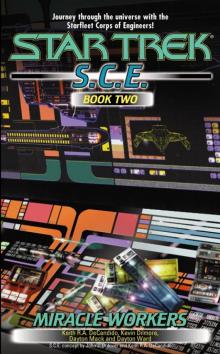 Miracle Workers
Miracle Workers Articles of the Federation
Articles of the Federation Supernatural Heart of the Dragon
Supernatural Heart of the Dragon War Stories: Book Two
War Stories: Book Two The Zoo Job
The Zoo Job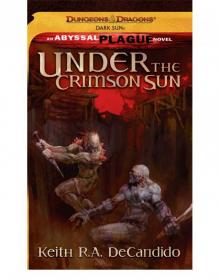 Under the Crimson Sun
Under the Crimson Sun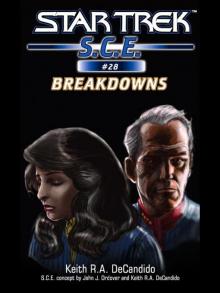 Breakdowns
Breakdowns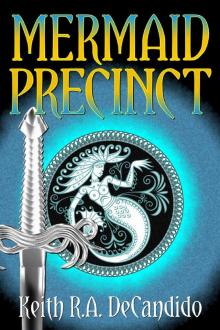 Mermaid Precinct (ARC)
Mermaid Precinct (ARC) Supernatural 1 - Nevermore
Supernatural 1 - Nevermore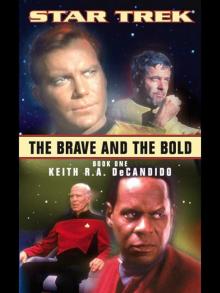 STAR TREK - The Brave and the Bold Book One
STAR TREK - The Brave and the Bold Book One Four Walls
Four Walls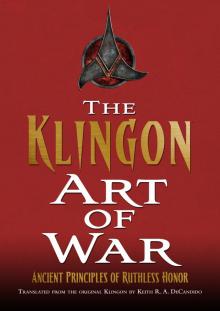 The Klingon Art of War
The Klingon Art of War Blackout
Blackout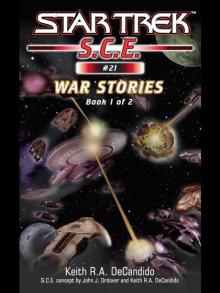 War Stories: Book One
War Stories: Book One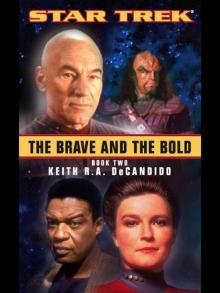 The Brave and the Bold Book Two
The Brave and the Bold Book Two Honor Bound
Honor Bound Sleepy Hollow: Children of the Revolution
Sleepy Hollow: Children of the Revolution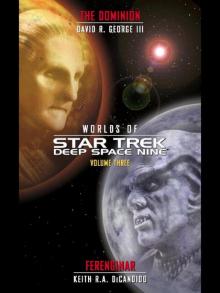 Worlds of Star Trek Deep Space Nine® Volume Three
Worlds of Star Trek Deep Space Nine® Volume Three Star Trek: TNG: Enterprises of Great Pitch and Moment
Star Trek: TNG: Enterprises of Great Pitch and Moment Genesis
Genesis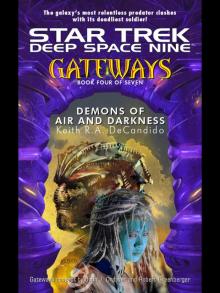 Demons of Air and Darkness
Demons of Air and Darkness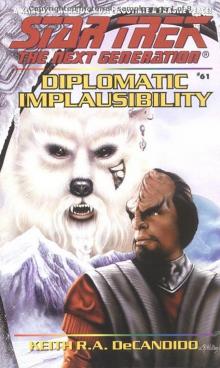 Star Trek - TNG - 61 - Diplomatic Implausibility
Star Trek - TNG - 61 - Diplomatic Implausibility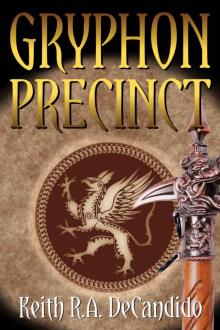 Gryphon Precinct (Dragon Precinct)
Gryphon Precinct (Dragon Precinct)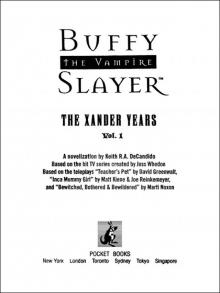 THE XANDER YEARS, Vol. 1
THE XANDER YEARS, Vol. 1 Nevermore
Nevermore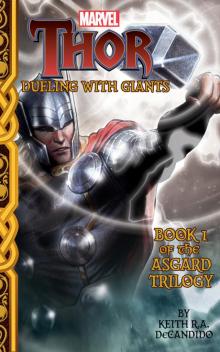 Thor
Thor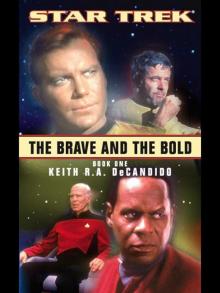 The Brave And The Bold Book One
The Brave And The Bold Book One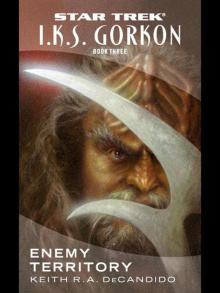 I.K.S. Gorkon Book Three
I.K.S. Gorkon Book Three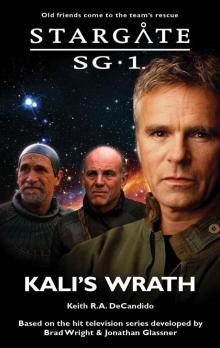 STARGATE SG-1: Kali's Wrath (SG1-28)
STARGATE SG-1: Kali's Wrath (SG1-28) Bone Key
Bone Key Guilt in Innocece
Guilt in Innocece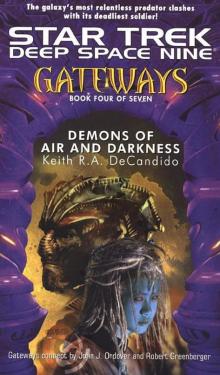 Star Trek - DS9 Relaunch 04 - Gateways - 4 of 7 - Demons Of Air And Darkness
Star Trek - DS9 Relaunch 04 - Gateways - 4 of 7 - Demons Of Air And Darkness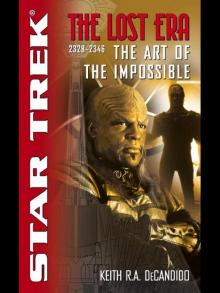 The Art of the Impossible
The Art of the Impossible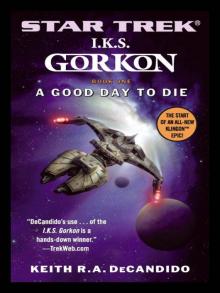 I.K.S. Gorkon Book One: A Good Day to Die
I.K.S. Gorkon Book One: A Good Day to Die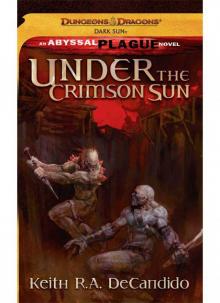 Under the Crimson Sun (the abyssal plague)
Under the Crimson Sun (the abyssal plague)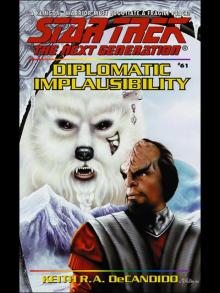 DIPLOMATIC IMPLAUSIBILITY
DIPLOMATIC IMPLAUSIBILITY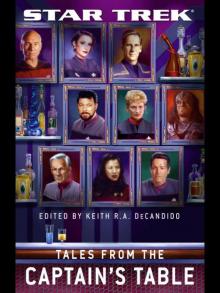 Tales from the Captain's Table
Tales from the Captain's Table A Burning House
A Burning House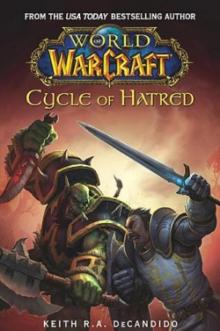 Cycle of Hatred (world of warcraft)
Cycle of Hatred (world of warcraft)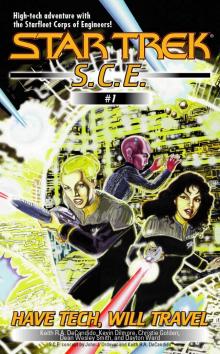 Have Tech, Will Travel
Have Tech, Will Travel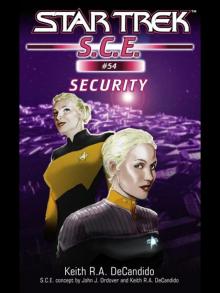 Security
Security